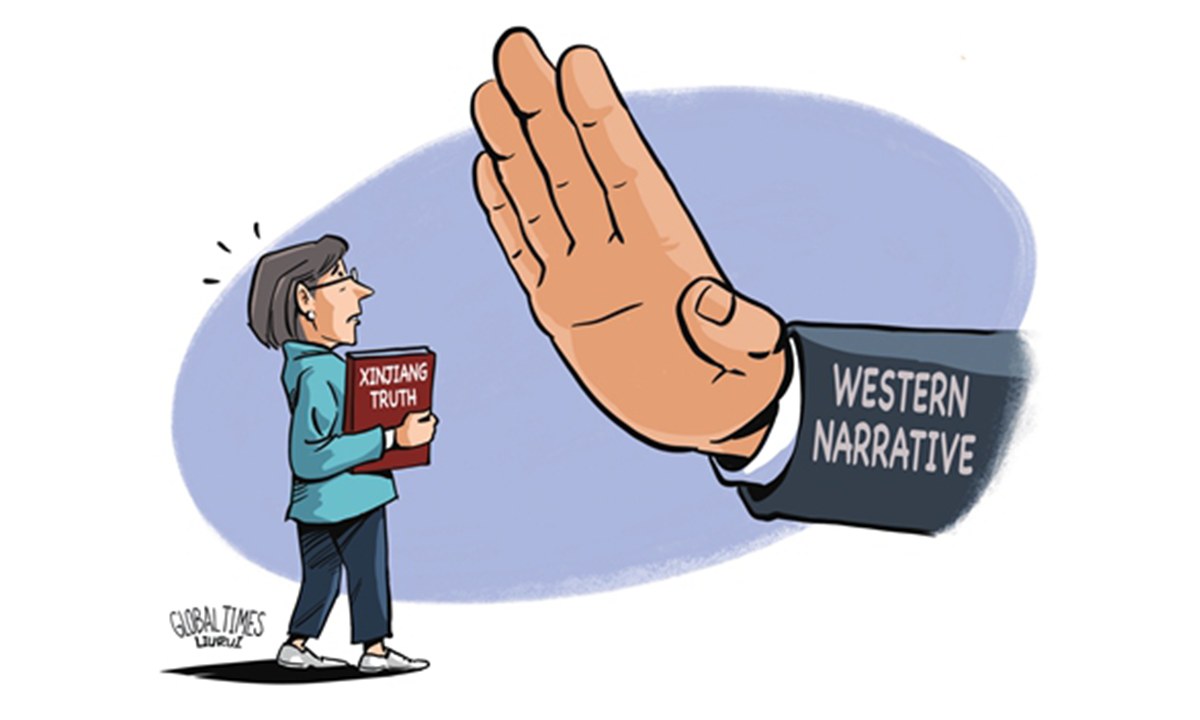
Illustration: Liu Rui/GT
Eleven Chinese academic institutes jointly released a letter of support to Maureen A Huebel, an Australian scholar, who has come under attack from anti-China forces after announcing her plan to visit China's Xinjiang region in 2024, the Global Times has learned from related academic institutes on Monday.
Recently, Huebel has been subject to cyber-violence by anti-China forces after revealing her plans to go China's Xinjiang region to conduct research.
"As scholars, we felt sympathy, regret and anger for what happened to her. At the same time, we are also pleased to see that universities and research institutes from various regions of China who have been engaged in Xinjiang-related research for a long time have unanimously stood up to support Ms. Maureen Huebel," read the joint letter.
Since Huebel announced on Twitter in March that she was planning to go to Xinjiang in 2024 to research poverty alleviation, she has been hounded by trolls and attacked by people insulting her on Twitter, even receiving death threats.
At the end of April, the Institute of China's Borderland Studies at Zhejiang Normal University and the Institute for Communication and Borderland Governance of Guangzhou-based Jinan University openly welcomed Huebel and expressed their willingness to assist the Australian with her research in the Xinjiang region. Later, several more academic institutes in the Xinjiang region and across China also extended their welcome, with 11 jointly releasing the latest letter.
In recent years, some foreign research institutions and so-called scholars have distorted the facts under the banner "academia" and wantonly manipulated Xinjiang-related issues. Either out of ideological prejudice or out of self-interest, they are all willing to manufacture and spread disinformation about China's Xinjiang, said the joint letter.
It is more infuriating that any scholar who maintains an objective attitude in the field of Xinjiang-related research will become the target of attacks and slander by anti-China forces, which fully demonstrates that the Cold War mentality and academic politicization are blurring the boundaries between politics and academia, fact and fiction, challenging the bottom line and dignity of academia, and threatening the facts and truth we all pursue, the joint letter noted.
In the joint letter, the eleven academic institutes across China welcomed Huebel and expressed their willingness to share the first-hand materials they have studied on the Xinjiang region's history, ethnicity, religion and other fields with global scholars.
In an article Huebel wrote to the Global Times in March, she stated reasons for her interest in the Xinjiang region when she noticed rising levels of Australian poverty and homelessness. Xinjiang was identified as among the fastest GDP growth of all Chinese provinces and regions.
However, when she tried to conduct preliminary research on Twitter, she came under fierce attack. She contacted Adrian Zenz, a notorious anti-China "scholar," and asked him for field research notes and methodology and published peer-reviewed journals, only to find herself blocked, she said.
"The more opposition I got, the more determined I became to forge a path to complete my project. I was blocking trolls that did not contribute to the research, sometimes 10 at a time, who ganged up on me, to what is called a Twitter pile-on," Huebel wrote.




